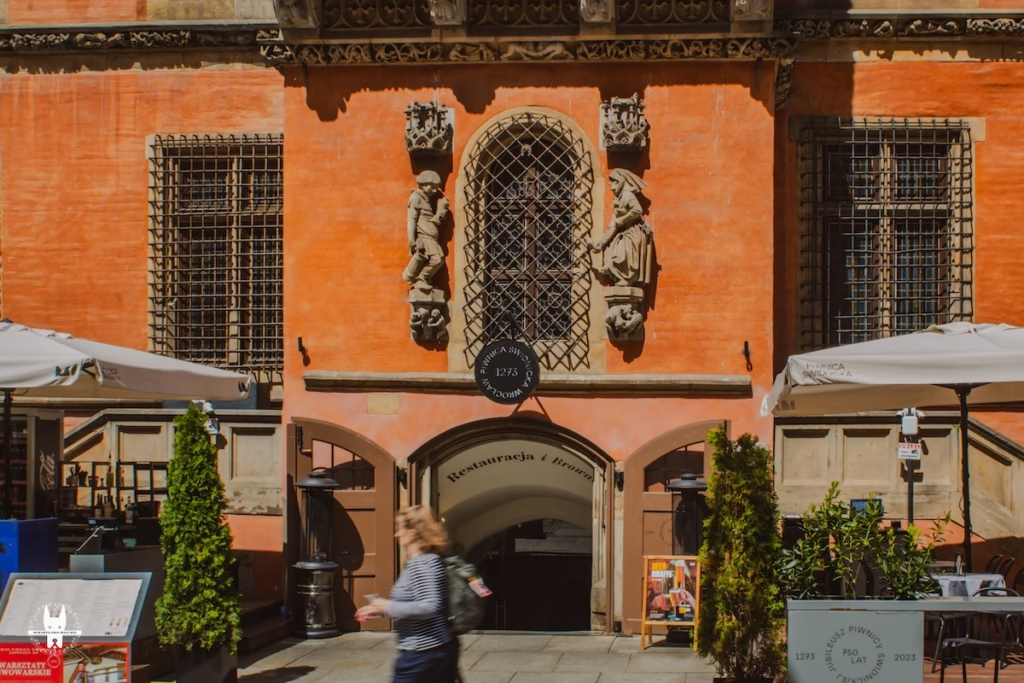Cover image courtesy: University of Wrocław
Poland has been a haven for Ukrainian war refugees since the 2022 Russian invasion, with Wrocław emerging as a vibrant hub for legal residency. Affordable living, a thriving job market, and a strong Ukrainian community make this city a top choice. Yet, securing a legal stay for Ukrainians in Poland demands navigating a complex web of visa and residency laws. From temporary protection to long-term residency, the process isn’t as simple as arriving with hope and a suitcase.
This 2025-ready guide breaks down the latest Poland immigration law 2025 for Ukrainians, visa options, and residency processes tailored to Wrocław. Whether transitioning from PESEL UKR or reuniting with family, here’s how to settle legally and build a future in Poland.
Why Wrocław Attracts Ukrainians in 2025?
Wrocław blends historic charm with modern opportunities, hosting over 100,000 Ukrainians since 2022. Its tech-driven job market, affordable rents, and safe neighbourhoods rival Warsaw or Kraków.
Following Russia’s invasion, Poland welcomed over 3 million Ukrainian refugees, with many settling in cities like Wrocław. In 2025, the number of Ukrainians in Poland has stabilised, but legal pathways to stay are becoming more defined. In Wrocław, a vibrant Ukrainian community thrives, contributing to both the cultural landscape and workforce. However, with Poland’s immigration law 2025 for Ukrainians focusing on stricter guidelines, refugees must regularise their status.
Residency Options for Ukrainian War Refugees in Poland
A legal stay for Ukrainians in Poland is dependent on their current status and long-term goals. Community centers like Fundacja Ukraina and Ukrainian cultural events foster a sense of belonging. For families, access to free public schools and healthcare adds appeal. However, a legal stay in Poland for Ukrainians requires compliance with evolving residency rules, especially in 2025.
Below are the primary pathways for 2025.
1. Temporary Protection under EU Council Directive
Under EU Council Directive 2001/55/EC, Poland grants temporary protection to Ukrainians fleeing the war legal stay until September 30, 2025. This status covers residence, work, healthcare, and education without a visa. To renew temporary protection, visit a Voivodeship Office with updated documents (passport, proof of residence). Check eligibility early to avoid gaps in legal status.
- Eligibility: Ukrainians arriving post-February 2022, including spouses and minor children.
- Requirements: Register at a Voivodeship Office (Urząd Wojewódzki) with a passport and proof of arrival.
- Limitations: Limited Schengen mobility; expires unless transitioned to a residence permit.
2. PESEL UKR – What It Means and What It Doesn’t
The PESEL UKR Poland number is a critical identifier for Ukrainians under temporary protection, unlocking access to healthcare, banking, and child benefits. However, it is not a residence permit and expires with temporary protection.
- How to obtain: Apply with a passport at a local municipality (Urząd Miasta) or Voivodeship Office (Urząd Wojewódzki). The procedures vary by region.
- Benefits: Work without permits, school enrollment, and 500+ child benefits.
- Next steps: Apply for a Karta Pobytu for long-term residency.
3. Applying for a Temporary Residence Card (Karta Pobytu)
The Karta Pobytu (temporary residence card) is the cornerstone of residency for Ukrainians in Wrocław, valid for 1-3 years with Schengen mobility and work rights. A Karta Pobytu permits 90 days of travel within the Schengen Area every 180 days, offering greater mobility than temporary protection.
- Eligibility: Ukrainians with PESEL UKR, employment, study enrollment, or family ties.
- Requirements: Passport, proof of income (PLN 1010/adult, PLN 823/child monthly), health insurance, registered housing.
- Application: File at Urząd Dolnośląski in Wrocław.
- Processing: 6-8 months, subject to delays.
Must read: How to Get a Temporary Residence Card (Karta Pobytu) in Poland – A Foreigner’s Step-by-Step Guide
4. Work Visa for Ukrainians and Employment-Based Stay
A Poland work visa for Ukrainians fits those with a job offer, requiring an employer-registered contract and ZUS compliance.
- Validity: Matches the contract, up to 3 years.
- Process: Apply via a Polish consulate abroad or convert to a Karta Pobytu in Poland.
5. Student Visa, Family Reunification & Other Special Cases
Family reunification allows Ukrainians with a Karta Pobytu to sponsor spouses or children. Students at institutions like the University of Wrocław can apply for residency based on enrollment.
- Family reunification: Requires legalised marriage/birth certificates, income, and housing.
- Student visas: Need proof of enrollment and funds (PLN 15,000/year).
Step-by-Step Process to Secure Residency in Wrocław
Navigating Wrocław immigration for Karta Pobytu applications requires precision. Here’s a legally compliant process for 2025.
- Prepare Documents –
- Valid passport and PESEL UKR.
- Proof of income (job contract, bank statements).
- Health insurance (ZUS or private).
- Rental agreement or address registration (meldunek).
- Apostilled, translated marriage/birth certificates for family applications.
- Schedule an Appointment – Book online at Urząd Dolnośląski. Slots fill quickly, so plan ahead.
- Submit Application – File at the Voivodeship Office. Additionally, pay PLN 100 for the plastic card print. Retain copies of all documents.
- Monitor Progress – Track via DUW. Request expedition if delayed beyond 90 days.
- Collect Karta Pobytu – Receive your card upon approval, ensuring legal residency.
- Handling Rejections – If your Karta Pobytu application is denied, file an appeal within 14 days at the Voivodeship Office. Consult a lawyer (SG Adwokaci) to strengthen your case with corrected documents or additional evidence.
Timeline: 6-8 months. Apply before the temporary protection expires to avoid gaps.

Bringing Your Family to Poland: What You Need to Know
Many Ukrainians want to reunite with their spouses or kids. The family reunification process mirrors the one in our Moving to Poland with Family guide. Here’s the deal:
- Eligibility: You need a Karta Pobytu with “access to the labour market.”
- Who can come: Spouse, minor kids, or dependent parents (in rare cases).
- Steps:
- Apply for a Type D visa at a Polish consulate abroad.
- Once in Poland, file for a family Karta Pobytu within 90 days.
- Submit legalised documents (marriage/birth certificates, income proof).
- Rights: Spouses can work without permits after getting a karta pobytu based on connection with family; kids get free public schooling.
Bonus: Kids under 18 may qualify for Poland’s 500+ benefit (PLN 500/month per child), even on temporary protection. Apply via ZUS. Eligibility requires a registered address (meldunek) and ZUS enrollment, ensuring compliance with residency conditions.
Healthcare for Ukrainians in Wrocław
Ukrainians with PESEL UKR or a Karta Pobytu can access Poland’s public healthcare via ZUS enrollment, covering doctor visits and hospital care. Private insurance is an alternative for faster services, costing PLN 100-200 monthly. Register with a local clinic upon arrival to secure medical support for you and your family.
2025 Immigration Law Changes: Stay Ahead
Poland is tightening its rules in 2025, and Ukrainian refugees in Poland in 2025 face new hurdles. Here’s what’s changing:
- Stricter Employment Checks: Authorities are verifying tax records to ensure legal work. Keep your contracts and ZUS payments clean.
- End of Wartime Exceptions: Some relaxed rules (e.g., simplified PESEL UKR registration) are phasing out.
- Mandatory Address Checks: Voivodeships now verify your registered address for residency applications.
- Long-Term Residency Scrutiny: Permanent residency requires 5 years of continuous legal stay, with stricter income proof.
What to do: Stay proactive. File applications early, keep documents updated, and consult a lawyer if you hit roadblocks.
Wrocław vs. Other Polish Cities for Ukrainians
How does Wrocław stack up for residency for Ukrainians in Wrocław? Here’s a quick comparison:
| City | Visa Cost | Job Market | Ukrainian Community | Processing Time |
|---|---|---|---|---|
| Wrocław | ~PLN 100-150 | Strong (tech, manufacturing) | Large, vibrant | 6-8 months |
| Warsaw | ~PLN 100-150 | Competitive (corporate) | Large but spread out | 8-10 months |
| Kraków | ~PLN 100-150 | Moderate (tourism, IT) | Smaller, tight-knit | 6-9 months |
Why Wrocław wins: Affordable living, a thriving Ukrainian scene, and faster processing than Warsaw.
Common Mistakes to Avoid in Your Application
- Confusing PESEL with long-term stay: PESEL UKR does not grant long-term residency. Make sure to apply for Karta Pobytu if you plan to stay long-term.
- Missing document translations or notarization: Ensure all your documents are properly translated into Polish and notarised to avoid delays.
- Skipping registration steps after entering Poland: Don’t overlook your obligation to register at the Voivodeship if you entered Poland under humanitarian grounds.
- Overstaying without initiating legal procedures: Always ensure that you are complying with the Poland immigration law 2025 for Ukrainians, even if you initially entered on a temporary basis.
How Can SG Adwokaci Help With Legal Stay for Ukrainians in Poland?
With a highly specialised team of Polish immigration lawyers proficient in Ukrainian and English, SG Adwokaci guides you through the process of transitioning from PESEL UKR to legal residence in Poland. Their team can assist with:
- Legalising your stay and handling the transition from temporary protection to long-term residency.
- Managing delays at the Urząd Dolnośląski.
- Offering support with appeals and legal advice on long-term residence options.
Understanding the particulars of legal stay for Ukrainians in Poland is essential for building a stable future. With the 2025 changes to immigration law coming into effect, it’s more important than ever to follow the correct procedures and avoid legal pitfalls. Regularising your stay ensures access to work, education, and healthcare while staying compliant with the law. Make sure to stay informed and act accordingly to avoid complications.
This blog is written in professional collaboration with SG Adwokaci. Mention it to unlock an additional discount on their expert residency services.
Further read: Poland’s Immigration Law Changes in 2025 – What Foreigners in Wrocław Need to Know
FAQs – Legal Stay for Ukrainians in Poland
Q1: Can I continue living in Poland with just a PESEL UKR in 2025?
Yes, you can, but only until 30.09.2025. You must apply for a Karta Pobytu to stay legally in Poland for the long term.
Q2: Do I need a residence card if I already work in Poland legally?
Yes, even if you work legally in Poland, you need to apply for a Karta Pobytu to formalise your long-term stay.
Q3: What’s the difference between PESEL and Karta Pobytu?
PESEL UKR is an identification number that gives access to basic services, but it is not a residence permit. Karta Pobytu is a residence card granting legal long-term stay, work rights, and mobility within the Schengen Area.
Q4: Can I bring my family from Ukraine under my protection in Poland?
Yes, under family reunification provisions, you can bring immediate family members to Poland.
Q5: How long does it take to process a residence permit in Wrocław for Ukrainians?
The processing time for a Karta Pobytu can take several months, depending on the completeness of your documentation and the current workload at the Urząd Dolnośląski.
Q6: What’s next for Poland residency in 2026?
Post-March 2026, temporary protection may end, requiring a Karta Pobytu for continued legal stay. Start applications in 2025 to prepare.
Share this:
- Click to share on Facebook (Opens in new window) Facebook
- Click to share on LinkedIn (Opens in new window) LinkedIn
- Click to share on Reddit (Opens in new window) Reddit
- Click to share on X (Opens in new window) X
- Click to share on WhatsApp (Opens in new window) WhatsApp
- Click to email a link to a friend (Opens in new window) Email





